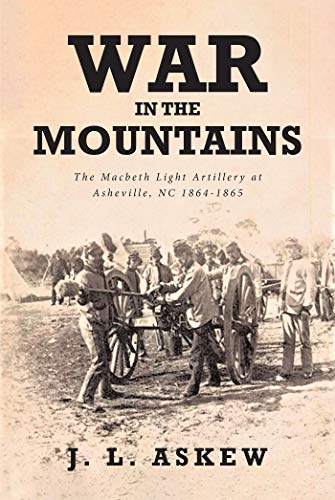War in the Mountains: The Macbeth Light Artillery at Asheville, NC: 1864-1865 received a 4+ star review, making it an IndieReader Approved title.
Following find an interview with author J.L. Askew.
What is the name of the book and when was it published?
“War in the Mountains: The Macbeth Light Artillery at Asheville, NC: 1864-1865”,
published December 30, 2020
What’s the book’s first line?
“By 1864, Charleston, South Carolina, had undergone nearly three years of war, enduring naval siege, and subjected to five months of shelling; yet the city had not fallen.”
What’s the book about? Give us the “pitch”.
The book is non-fiction, history, resulting from four years research, online, and at multiple locations: libraries, museums, genealogical societies, cemeteries, and sites where the events took place. The primary subject is the military unit where the author’s great-grandfather served in the Civil War, but the wealth of information gathered convinced me to expand the scope of the book, rendering the work a panorama of the mountain war in North Carolina and east Tennessee.
Rather than dryly reciting facts, I have tried to bring the characters to life, suggesting motivations for their actions, and sometimes alluding to interior behavior, thoughts fitting naturally in the context of the narrative, inferred from known facts. My main goal is true history while employing a style that follows the “show, don’t tell” method of writing. Finally, the point of view is that of the characters themselves. Readers who don’t normally like history should find the book interesting, purely as a story.
What inspired you to write the book? A particular person? An event?
The answer is yes, and yes. The person was H. F. Scaife, a former lieutenant in the Macbeth Light Artillery. The event occurred in early 2016 during research of my great-grandfather’s war experiences, when I discovered twelve newspaper articles written in 1886 by Scaife. The opening sentence of his recollections was striking.
“The Macbeth Light Artillery has an unwritten history that must be wrested from oblivion by the surviving members of the company, or it will be lost forever.” Scaife wrote seventeen bi-weekly articles for his hometown newspaper under the pen name VIDI, hoping publication would spur other members of the unit to do the same and a complete history would result. But nothing came of it and when a final effort was made to put Scaife’s reminiscences into book format, five of the articles were missing. Scaife’s son put notices in newspapers seeking the lost articles, but they were never found. At life’s end, Scaife’s dreams the Macbeth history might be preserved were unfulfilled.
Finding Scaife’s extant articles was a key moment in my research, revealing I had material that could be expanded into a book. Soon after the discovery, I visited the cemetery where Scaife is buried, standing at the grave, remembering what he wrote; his fear the Macbeth story would be forgotten and “lost forever.” I left, knowing it was for me to finish what he had begun.
What’s the main reason someone should really read this book?
I tried to write the book, following Joseph Conrad’s statement of purpose: “to make you hear, to make you feel – it is, before all, to make you see.” While lacking Conrad’s talent, I tried to stay true to his goal, writing in a novelistic style meant to draw the reader into the narrative, sharing the characters experience. The main reason to read the book is to enjoy a true adventure story.

